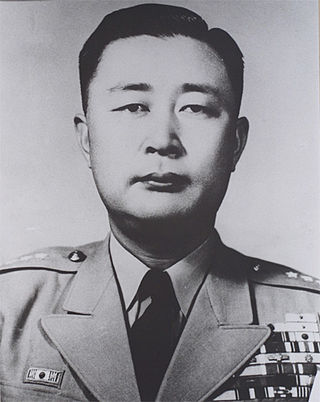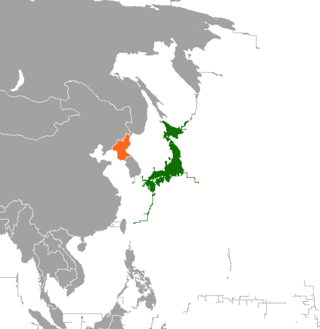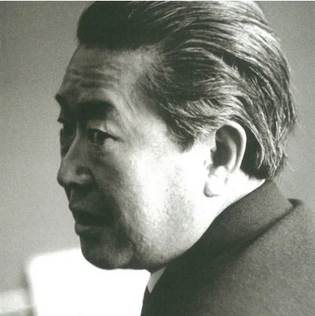| Pyongyang Sinri Primary School | |
| Chosŏn'gŭl | 평양신리소학교 |
|---|---|
| Hancha | 平壤新里小學校 |
| Revised Romanization | Pyeongyang Silli sohakgyo |
| McCune–Reischauer | P'yŏngyang Silli sohakkyo |
Pyongyang Sinri Primary School is a model primary school in Pyongyang,North Korea.
Prominent alumni include Pae Kil-su,Olympic pommel horse gold medalist in 1992.
Telecommunications in North Korea refers to the communication services available in North Korea. North Korea has not fully adopted mainstream Internet technology due to some restrictions on foreign interventions.

Pyongyang is the capital and largest city of the Democratic People's Republic of Korea (DPRK), commonly known as North Korea, where it is sometimes labeled as the "Capital of the Revolution". Pyongyang is located on the Taedong River about 109 km (68 mi) upstream from its mouth on the Yellow Sea. According to the 2008 population census, it has a population of 3,255,288. Pyongyang is a directly administered city with a status equal to that of the North Korean provinces.

Kim Jong Il was a North Korean politician who was the second supreme leader of North Korea. He led North Korea from the death of his father Kim Il Sung in 1994 until his own death in 2011, when he was succeeded by his son, Kim Jong Un. Afterwards, Kim Jong Il was declared Eternal General Secretary of the WPK.

Paik Sun-yup was a South Korean military officer. Paik is best known for his service during the Korean War, for being the first four-star general in the history of the South Korean military, and for his service as a diplomat and statesman for South Korea.

Education in North Korea is universal and state-funded schooling by the government. As of 2021, UNESCO Institute for Statistics does not report any data for North Korea's literacy rates. Some children go through one year of kindergarten, four years of primary education, six years of secondary education, and then on to university.
Pae Gil-su is a North Korean gymnast.

Sunch'ŏn is a city in South Pyongan province, North Korea. It has a population of 297,317, and is home to various manufacturing plants. The city is on the Taedong River.

The Catholic Church in North Korea retains a community of several hundred adherents who practice under the supervision of the state-established Korean Catholic Association (KCA) rather than the Roman Catholic hierarchy. The dioceses of the Church have remained vacant since Christian persecutions in the late 1940s. The most prominent congregation is that of Pyongyang, which meets at Changchung Cathedral. According to a KCA official, two other congregations exist. The state ideology of Juche has largely displaced Catholic faith, and full services are provided only to people with a Catholic family background.

Pyongyang Sports Club is a North Korean organization of education specialty with several departments. This organization is based in Pyongyang and plays at the Kim Il Sung Stadium. As the sports club of the Workers' Party of Korea and Government of Pyongyang, Pyongyang SC is the largest sports club not affiliated with a state ministry.

Amnokgang Sports Club is a North Korean men's multi-sports club. Based in Pyongyang, the club competes in the DPR Korea Premier Football League.

Propaganda is widely used and produced by the government of the Democratic People's Republic of Korea. Most propaganda is based on the Juche ideology, the promotion of the Workers' Party of Korea, and hostilities against both the Republic of Korea and the United States

The Pyongyang Korean School for Foreigners (Korean: 평양외국인학교) is a primary school in Pyongyang, North Korea, exclusively for foreign children. It has also a facility for foreign children studying on secondary school level. The school is located at the Munsudong diplomatic compound in Pyongyang, the capital of the DPRK. The children who attend are mainly dependents of the diplomatic community and the United Nations agencies in the country, although also children of foreign businessmen, mainly Chinese, have been joining the school. All teachers are Korean. The language of instruction is English. Local textbooks in English are used. English and mathematics are the two major subjects, with Korean language, music, art and physical education as minor subjects; from class 3 onwards also science is provided as minor subject. In the early 1990s the official name in English of the school was "Pyongyang Foreigners School", which is the straight translation of the name of the school in Korean (평양외국인학교), which did not change.

Japan–North Korea relations refers to international relations between Japan and North Korea. Relations between Japan and North Korea have never been formally established, but there have been diplomatic talks between the two governments to discuss the issue of kidnapped Japanese citizens and North Korea's nuclear program. Relations between the two countries are severely strained and marked by tension and hostility. According to a 2014 BBC World Service poll, 91% of Japanese people view North Korea's influence negatively, with just 1% expressing a positive view; the most negative perception of North Korea in the world.

The Korean Children's Union (KCU) is the precursor to the Socialist Patriotic Youth League of North Korea contributing to North Korean youth movement and pioneer movement. It is for children aged six to fifteen and is a political organisation linked to the Workers' Party of Korea. Its uniformed branch is known as the Young Pioneer Corps, which admits children and pre-teens ages nine to 15. The organization operates chapters in elementary and secondary schools nationwide. It teaches children about Juche, and other ideologies behind the North Korean system. Youth above the age of 15 may join the Socialist Patriotic Youth League.

Pen Varlen was a Soviet Russian-Korean painter and graphic artist.

Chōsen gakkō are North Korean schools in Japan. "Chosen" means Korean, referring to the Joseon dynasty, and "gakko" means school. They are affiliated with the Chongryon (the General Association of Korean Residents in Japan) which has strong ties to North Korea. Sometimes Chosen schools are referred to as Chongryon schools.

Chiba Korean Primary and Junior High School is a North Korea-aligned Korean international school in Hanamigawa-ku, Chiba, Chiba Prefecture, Japan, in the Tokyo metropolitan area. As of 2014, the principal is Kim Yu-sop. The school uses the Korean language as its language of instruction. The school operates under the authority of the Chongryon.

North Korean cuisine is the traditional culinary practices and dishes of North Korea. Its foundations are laid by the agricultural and nomadic traditions in southern Manchuria and the Korean Peninsula. Some dishes are shared by the two Koreas; however, availability and quality of Northern cuisine is much more significantly affected by sociopolitical class divides.
The Kosin Presbyterian Church in Korea, also called Korea-pa, is an Evangelical Reformed and Presbyterian denomination in the Republic of South Korea. Although, congregations have spread all over North America and in many other countries.